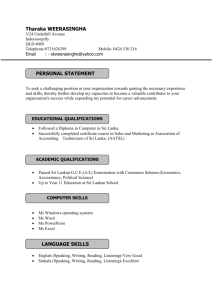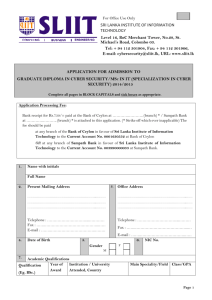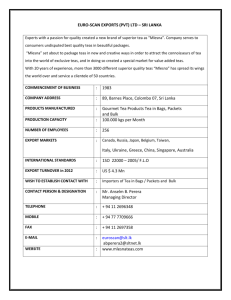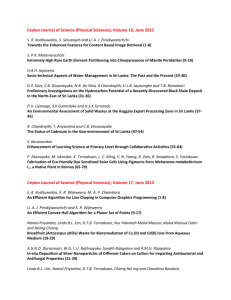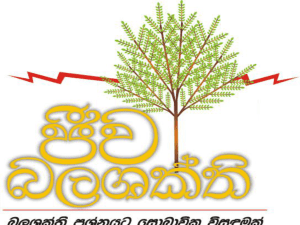August 14, 2015
advertisement
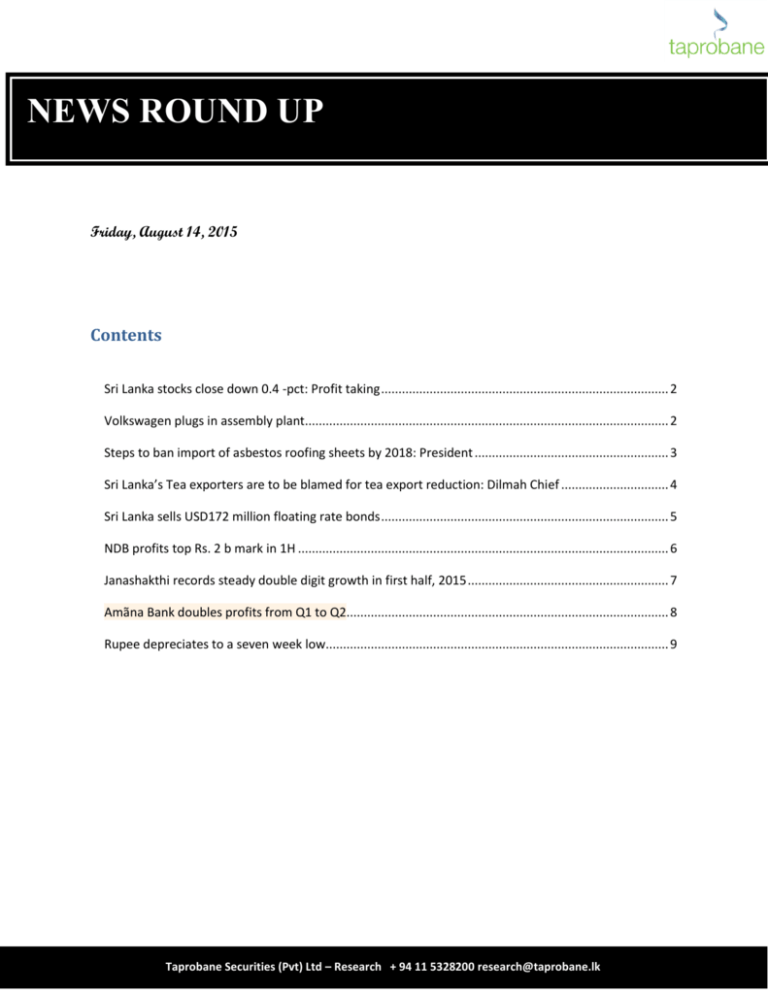
NEWS ROUND UP Friday, August 14, 2015 Contents Sri Lanka stocks close down 0.4 -pct: Profit taking ................................................................................... 2 Volkswagen plugs in assembly plant......................................................................................................... 2 Steps to ban import of asbestos roofing sheets by 2018: President ........................................................ 3 Sri Lanka’s Tea exporters are to be blamed for tea export reduction: Dilmah Chief ............................... 4 Sri Lanka sells USD172 million floating rate bonds ................................................................................... 5 NDB profits top Rs. 2 b mark in 1H ........................................................................................................... 6 Janashakthi records steady double digit growth in first half, 2015 .......................................................... 7 Amãna Bank doubles profits from Q1 to Q2............................................................................................. 8 Rupee depreciates to a seven week low................................................................................................... 9 Taprobane Securities (Pvt) Ltd – Research + 94 11 5328200 research@taprobane.lk Sri Lanka stocks close down 0.4 -pct: Profit taking Sri Lanka’s stocks closed down 0.39 percent on Thursday, with losses in some index heavy and Telecom stocks and investors taking profit, brokers said. The Colombo benchmark All Share Price Index closed 29.15 points lower at 7,442.75 down 0.39 percent. The S&P SL20 closed 24.51 points lower at 4,128.24 down 0.59 percent. Turnover was 979 million rupees, down fron 2.12 billion on Wednesday with 48 stocks closing positive against 115 negative. The main index showed losses in Dialog Axiata closing at 11.20 rupees, down 0.20 rupees with over 980,000 shares traded and John Keells Holdings closing at 192.00 rupees, down 1.10 rupees. “Foreign investors remained as net sellers for the 10th consecutive session, selling shares worth of 24 million rupees,” Lanka Securities. “Foreign participation was 12 percent.” Net foreign outflows were seen in Laugfs Gas Holdings 35 million rupees, John Keells Holdings 34 million rupees and Aitken Spence 16 million rupees while net inflow was mainly seen in Laugfs Gas Holdings non-voting 36 million rupees. In banking stocks, Commercial Bank closed at 172.10 rupees, down 1.20 rupees and Hatton National Bank closed at 225.50 rupees, down 2.30 rupees. DFCC closed at 198.50 rupees, down 5.20 rupees. (LBO) Volkswagen plugs in assembly plant Notching up more foreign investment for Sri Lanka, the Board of Investment (BOI) inked a $26.5 million assembly plant deal with German giant Volkswagen yesterday. The much-discussed deal will see Volkswagen building an assembly plant in Kuliyapitiya on an estimated 30-acre plot of land that will provide employment for about 200 people. A separate training facility will be set up with trainers from Germany to provide manpower for the plant and the motor car industry in general. The venture has been given an eight-year tax holiday. $ 21.5 million will be invested as direct foreign investment while the rest will be borrowed capital. “Prime Minister Ranil Wickremesinghe was very focused on training and the facility will provide training to about 2,000 people who can get jobs locally or go abroad. We are very happy to see a project that we have worked on for such a 03-3long time coming together,” Senok Group President Noel Selvanayagam told media at the signing ceremony organised by BOI. Senok Group, which signed on behalf of Volkswagen as the local dealer, will pick between three pieces of land in Kuliyapitiya and the project will kick off immediately. The assembly plant will be completed Taprobane Securities (Pvt) Ltd – Research + 94 11 5328200 research@taprobane.lk within two years and is expected to churn out 500 odd vehicles every 12 months for three years to be exclusively sold in Sri Lanka, BOI Chairman Upul Jayasuriya said. The models of the vehicles are yet to be decided but they are likely to be passenger cars, Sports Utility Vehicles (SUVs) and Multi Utility Vehicles (MUVs). As they are assembled in Sri Lanka, they will likely enter the market at a cheaper price, Jayasuriya noted. He was also confident given the strong economic relationship Sri Lanka enjoys with the rest of South Asia export markets for the vehicles would be found, giving the venture room to expand. “We are happy and proud of this Volkswagen initiative. For many decades the BOI has funnelled investment to many fields but it lagged behind it the motor industry. The Prime Minister drove this investment and will take pride in it becoming a reality,” he added. Organisers also praised the German Embassy for its assistance and Senior Advisor to the Prime Minister R. Paskaralingam for pushing through the venture in a matter of 40 days. The BOI Chairman also insisted timing of the deal signing was not intentional and many other investment projects were in the pipeline. (DailyFT) Steps to ban import of asbestos roofing sheets by 2018: President President Maithripala Sirisena said that he would hold discussions with the Cabinet of Ministers and arrive at a decision to ban the importation of asbestos roofing sheets into the country by 2018. The President further said that he would take this decision taking into the consideration of the health and the good hygiene of the people in the country. He made these observations delivering the keynote address at the ‘Sri Lanka Ceramics and Glass Symposium 2015’ held in Colombo on Wednesday. This year’s theme of the Symposium is the ‘Powering Growth through Collaboration’. President Sirisena recalled that even when he was acting as the Minister of Health he had been presented several proposals to ban the importation of asbestos roofing sheets into the country, but he was unable to implement those proposals because of the protection provided by high-ranking officials of the then Government. He emphasised that the present Government would not encourage the people who import things into the country that can be produced in our own country, adding that the Government would take every possible step to strengthen the local industries through a clear national policy. When the Government increases taxes on imported goods that can be produced in our own country, it will discourage and limit importation of those goods on one hand and strengthen the local industries on the other. Under these circumstances, the local producers should fulfil their obligations by supplying high quality products to the consumers, the President said. Deputy Minister of Policy Planning and Economic DevelopmentDr. Harsha De Silva, Sri Lanka Export Development Board Chairman Bandula Egodage and Sri Lanka Ceramics & Glass Council (SLACGC) President Mahendra Jayasekera also spoke at the Symposium. (DailyFT) Taprobane Securities (Pvt) Ltd – Research + 94 11 5328200 research@taprobane.lk Sri Lanka’s Tea exporters are to be blamed for tea export reduction: Dilmah Chief Sri Lanka’s Tea exporter, Dilmah says tea exporters who create various brand names at very cheap price levels in the global market are to be blamed on the lesser demand for “Ceylon Tea”. However, the importance of Russia and other CIS countries to Ceylon tea continues, though on reduced volumes of bulk tea and value added exports, Chairman of Dilmah, Merrill J Fernando said. “This trend is likely to continue,” Fernando told shareholders in Tea bag exporter Ceylon Tea Services Ltd annual report. “As I pointed out in several of my previous reports, this misfortune is our exporters own creation; developing importers’ own brand names at very cheap price levels which are extremely harmful to longterm interests of our tea industry,” “My warnings, sounded year after year, on this pending danger were not heeded by tea interests or by the government,” “Now, we have begun to pay the penalty for this neglect resulting in far less demand for bulk tea resulting in lower prices and negligible demand for value added tea from the very sources that benefited from our exporters’ generosity towards establishing their own brand names at low cost,” “Those brand names now purchase cheaper tea from other sources such as Vietnam, Indonesia, China, causing serious harm to the quality and image of Ceylon tea by supplying under the same brand names and labeling cheap blends as “CEYLON TEA”.” Fernando says these exporters inflict even greater harm by re exporting their “CEYLON TEA” to other countries at price levels which are 40 percent to 50 percent below the genuine Ceylon Tea exported from Sri Lanka. “Such are the rewards reaped by our exporters, who helped build Russian brand names at the expense of our own Ceylon Tea!,” “All exporters, as well as Ceylon tea, are paying the penalty for the folly of a few tea traders,” “Government and semi government bodies as well as private sector institutions watch helplessly while our most valuable industry is destroyed.” Sri Lanka’s Tea exports, which were severely affected by the lower demand from Russia and the Middle East, declined for the eight consecutive month in May 2015, recording a drop of 12.1 per cent in May 2015. Official data shows Sri Lanka exported 123.6 million US dollar worth tea in May 2015 compared to the 140.6 million US dollar tea exports in the same month last year. Tea exports to Russia and the Middle East declined by 19.2 per cent and 9.7 per cent, respectively, during May 2015 compared to the corresponding month of 2014. Taprobane Securities (Pvt) Ltd – Research + 94 11 5328200 research@taprobane.lk Fernando says the company hopes to seek government cooperation and understanding of the need to extend assistance to everyone’s entrepreneurial efforts and protection from abuse of the industry and the trade. “Unless such government cooperation is forthcoming, there is little hope for rescuing the trade from the deep pit it has fallen into,” Fernando told shareholders. “I sincerely hope the new government, we elect in August, will realize the desperate need to salvage Ceylon tea from the deep pit it has been driven into by exploitation, not only by foreign traders but also by our own traders, our own producers and by our own governments too,” “Your company is making serious, very costly inroads into new markets to enhance the image of Ceylon Tea which remains tarnished by activities of unscrupulous traders.” Fernando added that the Government should completely review the lease extensions of Regional Plantation Companies as “Several estates have been leased out at high rates, completely disproportionate to the lease rentals paid to government by RPCs.” He says the plantations require complete restructuring today following successive governments’ failure to monitor their progress although tools for doing so are in place. “As a result, while some regional plantation companies have done well by investing in the development of their properties, others have ruthlessly exploited theirs,” Fernando said. “Lease extensions to RPCs should be reviewed, based on performance and on specific terms and conditions which should be monitored by a very experienced, competent management body formed from the private sector.” Tea bag exporter Ceylon Tea Services Ltd., part of the Dilmah brand group, said net profit fell 5.8 percent to 801 million rupees for the financial year ended March 31, 2015. Revenue fell 1.7 percent to 7,357 million rupees in the same period, according to Company’s annual report results. The company is one of the largest exporters of tea bags in Sri Lanka and promotes single origin Ceylon teas. Its Dilmah brand is the most successful of the value-added Ceylon tea brands in overseas beverage markets. The group is also a big supplier of bulk teas to blenders and packers overseas.(LBO) Sri Lanka sells USD172 million floating rate bonds Sri Lanka has sold 172.3 million dollars of floating rate bonds with tenors of 1 year 7 months and 2 year 5 months, the state debt office said in a statement. Taprobane Securities (Pvt) Ltd – Research + 94 11 5328200 research@taprobane.lk The debt office sold 78.10 million US dollars of 1 year 7 month bonds at 349.47 basis points above the 6-month London Interbank Offered Rate, the statement said. Another 94.27 million US dollars of 2 year 5 month bonds were sold at 373.83 basis points above 6month LIBOR. The bond has to be settled on August 18.(LBO) NDB profits top Rs. 2 b mark in 1H NDB Bank said yesterday it has recorded a Profit After Tax of Rs. 2 billion for the first half of 2015, up by 7% Year-on-Year (YoY) growth as compared to 30 June 2014.Total operating income of the Bank grew by 5% compared to H1 2014, to reach Rs. 6,241 million. Net Interest Income (NII) declined marginally by 3% due to the relatively low credit growth environment which prevailed in the country.Net fee and commission income which is a primary contributor towards core-banking operations increased by 12% compared to the prior period. The Bank’s Other operating income also increased by Rs. 602 million, to reach Rs. 1,044 million for the period, which included equity income of Rs. 965 million as compared with Rs. 431 million for the prior period. At a Group level, total operating income declined marginally by 3% to reach Rs. 6,136 million. The decrease was primarily due to the reduction in Net gainsfromNDB Group’s total financial investments portfolio.However, NDB Group’s Net fee and commission income recorded a significant growth of 28% over the prior period due to the increased performance of the fee based Group Companies. The Bank’s Impairment charges for loans and other losses for the first six months of 2015 was Rs. 198 million, compared to Rs. 222 million of 2014, a reduction of Rs. 24 million which was primarily due to the improved quality of the Bank’s loan portfolio. Total operating expenses grew by 16%, an increase of Rs. 411 million compared to the prior period. The main cost driver during the period under review wasnine new branches which were added to the Bank’s branch network.At a Group level, the operating expenses of Rs. 3,280 million grew by 18% over the first half of 2014.NDB Group continues to strive in its cost management initiatives, ensuring that the Group maintains an optimum Cost to income ratiowhich in turn will ensure higher returns to its shareholders. The Bank’s Balance Sheet recorded moderate growth during the first six months of the year, with Total assets growing at 3%.Loans and receivables to customers grew at the same pace of 3%, reflecting the slow credit growth experienced across the banking industry. The Non-Performing Loan ratio (NPL) of the Bank for the six months ended 30 June 2015 was 2.64%, still one of the best NPL ratios in the industry and compares with an industry average of 4.5% (as at April 2015). Customer deposits recorded a 12% growth compared to the year ended 31 December 2014.The Bank issued and placed listedrated unsecured subordinated redeemable debentures of Rs. 10 billion with a maturity period of five years during the second quarter of 2015. The Bank continues to remain well capitalised with a 10.12% Tier I capital adequacy ratio and a 14.69% Total capital adequacy ratio, well above the minimum statutory requirement. Earnings per Share (EPS) for the period under review was Rs. 17.54. The share price of the Bank closed at Rs. 260.30 on 30 June 2015, with a resultant PE ratio of 14.84 (times). NDBremains focused in generating the highest returns to its shareholders for their commitment and confidence placed in NDB. NDB said first half results were achieved with banking industry remaining challenging with credit growth slower than anticipated and severe competition posed by a large number of banking and non-banking institutions. The macro-economic outlook also carries uncertainty with the Parliamentary elections Taprobane Securities (Pvt) Ltd – Research + 94 11 5328200 research@taprobane.lk scheduled to be held in August 2015. Despite such factors, National Development Bank PLC (NDB) is well focused on its strategy in achieving its targets and generating sustainable returns to all its stakeholders. NDB Chief Executive Officer Rajendra Theagarajah, commenting on the six months’ performance, reiterated that the Bank is resolute in its strategic growth momentum. NDB has experienced considerable improvement in its share in the market, and will continue to grow its share through competitive and innovative product offerings and excellent customer service. NDB received high recognition at the recently concluded Asian Banking & Finance Awards 2015. The Singapore based magazine awarded NDB with the titles of ‘Sri Lanka Domestic Cash Management Bank of the Year’ and ‘Sri Lanka Domestic Project Finance Bank of the Year’ under the Wholesale Banking Awards category and ‘Domestic Retail Bank of the Year – SriLanka’ and ‘SME Bank of the Year – SriLanka’ under the Retail Banking Awards category. These awards are a testimony of the effectiveness with which the Bank serves across a multitude of banking services and across all customer segments such as individuals, micro business ventures, small and medium enterprises and large corporates. Furthermore, a team of professionalsfrom NDB which representedthe Asia and Europe cluster at the 7th International Asset & Liability Management Competition emerged champions of the competition at the grand finale held on 2 July. The event was organised for the seventh consecutive year by a consortium of international agencies that promote financial development globally.This competition offered NDB a unique opportunity to showcase its ALM and risk management skills globally whilst affirming the high level of expertise and proficiency of the Bank in the respective areas. (DailyFT) Janashakthi records steady double digit growth in first half, 2015 Janashakthi Insurance PLC posted a year-to-date Gross Written Premium (GWP) of Rs. 4.9 billion as of 30 June, a 15% growth year-on-year, to end the first half of the year with after tax profits of Rs. 200 million. The company registered a 21% growth in GWP in the life insurance segment on the back of a remarkable increase of 48% in First Year Life Premiums, the highest recorded since it set out on a strategic drive to transform this business. The GWP for general (non-life) insurance segment grew by 13%. Janashakthi posted these impressive numbers while continuing to honour its commitment to policy holders. The insurer settled claims 06-3totalling Rs. 2.2 billion across life and non-life categories at the end of first half, 2015 of which Rs. 1.2 billion was disbursed in Q2, 2015. “The double digit growth in Gross Written Premium alongside the Rs. 1.2 billion claims payout in Q2, 2015 is a reflection of our mission of ‘bringing hope and prosperity to all’. Having kicked off the year on a positive note, we continue to maintain the growth momentum as we strive to offer greater returns to our shareholders while delivering on our promises to clients,” said Janashakthi Insurance PLC Managing Director Prakash Schaffter. With a paid up share capital of Rs. 1.496 billion, Janashakthi Insurance continues to reflect a healthy capital structure. Its asset base grew to Rs. 22.18 billion in the first half, 2015 from Rs. 20.87 billion as at year end 2014 while the Life Insurance Fund grew from Rs. 7.3 billion as at year end 2014 to Rs. 8.5 billion. Taprobane Securities (Pvt) Ltd – Research + 94 11 5328200 research@taprobane.lk The company split into two entities, Janashakthi Insurance PLC (JIPLC) and Janashakthi General Insurance Limited (JGIL), in January 2015 in compliance with regulatory reforms. While the restructuring of Life operations have resulted in increased compensation and implementation costs, Janashakthi noted that this would only be incurred during the first year of operations with the benefits being materialised in the years to come. Janashakthi had welcomed renowned Sri Lankan business leader Husein Esufally to the Board of Janashakthi Insurance PLC., and its subsidiary Janashakthi General Insurance Limited as Deputy Chairman with effect from 22 July. The company’s Director/Chief Executive Officer Jude Fernando was appointed as an Executive Director to the Boards of the two entities at this time. The Board of Directors of Janashakthi Insurance PLC., comprises of W.T. Ellawala, Non–Executive Chairman; Husein Esufally, Non–Executive Deputy Chairman; Prakash Schaffter, Managing Director; Jude Fernando, Chief Executive Officer/Executive Director; L.C.R. de C. Wijetunge, Non-Executive Independent Director; Manjula Mathews, Non-Executive Director; Ramesh Schaffter, Executive Director; Eardley Perera, Non-Executive Independent Director; and Anushya Coomaraswamy, Non-Executive Independent Director. (DailyFT) Amãna Bank doubles profits from Q1 to Q2 Sri Lanka’s pioneer non-interest based licensed commercial bank, Amãna Bank, achieved an impressive acceleration in profitability during Q2 2015 by recording a profit of Rs. 47.5 million compared to Q1 profit of Rs. 23.0 million. As a result, the bank’s profit for the first half of 2015 propelled to Rs. 70.6 million, compared to the loss after tax of Rs. 134.9 million recorded in the corresponding period of 2014. The bank’s top line also showcased noteworthy performance during the six months ended 30 June, by achieving a financing income of Rs. 1,337.2 million and a net operating income of Rs. 950.6 million. Aided by operating efficiency06-5 and cost management initiatives, the bank was successful in achieving an operating profit of Rs. 142.4 million compared to the operating loss of Rs. 112.2 million recorded in the corresponding period of 2014. The growing advance and deposit portfolios, which stood at Rs. 28.1 billion and Rs. 33.0 billion respectively, ensured that the bank recorded a commendable growth in terms of top line performance and total assets. The total asset base, which grew by 15.2% during the first half of the year, surpassed the Rs. 40 billion mark. The bank continued to maintain a quality advance portfolio through effective credit risk management policies and procedures which resulted in the bank recording a low gross non performing advances ratio of 1.38%, well below the industry average. Commenting on the bank’s first half performance, Chief Executive Officer Mohamed Azmeer said: “I am happy to note the performance and growth of the Bank achieved during this period. We owe this success to our valued customers, who have placed their confidence and trust in our bank and our unique operating model. Over the last six months the employees of the bank have worked tirelessly to put in motion our five-year strategic plan, which is now reaping the desired results. Staying on course with the strategic plan, we are expecting these numbers to further improve.” Taprobane Securities (Pvt) Ltd – Research + 94 11 5328200 research@taprobane.lk Amãna Bank is the first licensed commercial bank in Sri Lanka to operate in complete harmony with the non-interest based Islamic banking model and is listed on the Diri Savi Board of the Colombo Stock Exchange. Fitch Ratings recently assigned the Bank a National Long Term Rating of BB(lka) with a Stable Outlook. Powered by the stability and the support of its strategic shareholders including, Bank Islam Malaysia Berhad, AB Bank in Bangladesh and The Islamic Development Bank based in Saudi Arabia, Amãna Bank is making strong inroads within the Sri Lankan banking industry and is focused on capitalising the growing market potential for its unique banking model across the country. (DailyFT) Rupee depreciates to a seven week low The depreciating trend in the USD/LKR rates continued yesterday as well with spot contracts dipping to hit a seven week low of Rs.133.90. The trend was driven in line with import demand, persistent foreign selling in both government rupee bonds and the Colombo stock market coupled with international currency developments, according to market sources. The total USD/LKR traded volume for the previous day (12 August) was $ 38.40 million. Meanwhile, the sentiment in secondary markets for government securities turned bearish once again yesterday as activity dried up drastically with the Parliamentary election around the corner. Minute amounts on the maturities of 1 June 2018, 1 May 2020 and 1 August 2025 were traded at levels of 7.80%, 8.40% and 9.60% respectively while the 364 day bill was offered at levels of 6.65%. In money markets, the overnight call money and repo rates remained mostly unchanged to average 6.13% and 5.89% respectively as surplus liquidity stood at Rs. 65.53 billion yesterday.(DailyFT) Taprobane Securities (Pvt) Ltd – Research + 94 11 5328200 research@taprobane.lk


